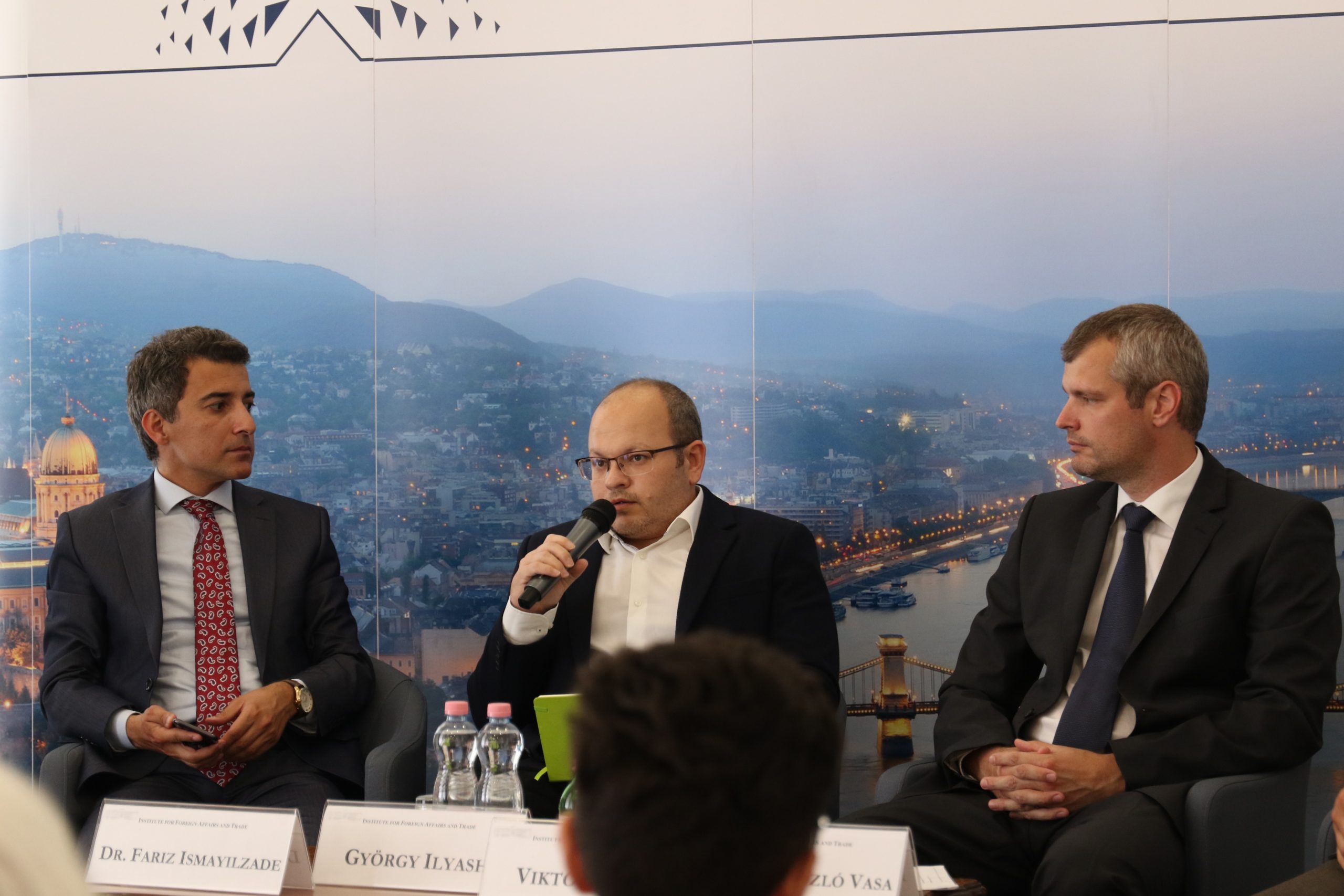The event entitled “30th anniversary of the establishment of diplomatic relations between Azerbaijan and Hungary” took place on June 21, 2022, organized by the Institute for Foreign Affairs and Trade (IFAT). The participants of the discussion were Dr. László Vasa, Chief Advisor and Senior Research Fellow of the Institute for Foreign Affairs and Trade, Dr. Fariz Ismayilzade, Director of the Institute for Development and Diplomacy, Mr. Naghi Ahmedov, Leading Advisor of the Center of Analysis of International Relations, Mr. Máté Vigóczki, Research Fellow of the Mathias Corvinus Collegium, Mr. György Ilyash, Research Fellow of the Institute for Foreign Affairs and Trade, Mr. Hafiz Mirzaghayev, Lead HSE Engineer of SOCAR (online) and Mr. Viktor Sverla, Strategy Director of MoL.
Opening statements at the event were made by H.E. Tahir Taghi-Zadeh, Ambassador Extraordinary and Plenipotentiary of the Republic of Azerbaijan to Hungary, H.E. Viktor Szederkényi, Ambassador Extraordinary and Plenipotentiary of Hungary to the Republic of Azerbaijan (online) and Dr. Márton Ugrósdy, Director of the Institute for Foreign Affairs and Trade.
The subjects for the first-panel discussion were the impact of the geopolitical situation in Eastern Europe on connectivity and the growing importance of the Middle corridor, including the Zangezur corridor as a source of hope for the region. Central Asia expert, Dr. László Vasa explained, why the Trans-Caspian International Transport Route, also known as the Middle Corridor, surges as a good alternative for the near future: nowadays, we are facing serious difficulties this would be a good option for China to link to the European territories. Consequently, China’s political, and economic developments will matter to the EU more than ever. Dr. Fariz Ismayilzade talked about the fact that Azerbaijan recently has been investing a lot in the railway infrastructures for several reasons: such as the Zangezur corridor with opening up regional development opportunities which will create new transport opportunities for the whole region and strengthening Azerbaijan’s position in the South Caucasus. Mr. Naghi Ahmedov added, that the Middle Corridor was „underdeveloped” for a long time, but now it is in the process of changing. Then he shared some policy recommendations such as facilitating greater operational transparency and policy coordination.
The subject for the second panel was the changing geopolitics of energy in Europe. Russia expert Mr. Máté Vigóczki emphasized that for the largest country on earth, geography means everything and it precisely describes how Russia is thinking. Russia always wanted to be the connection to Europe and be the real integrator of the region but it has no financial background to accomplish it. However, China has the financial potential- he explained. Strategy Director of MoL Mr. Viktor Sverla talked about the challenges which are coming from energy insecurity and high dependency on Russia: these energy sources have had historic ties for decades, and if we want to replace a part of or the full Russian oil it will not happen from one day to the next. Russia expert, Mr. György Ilyash emphasized the important fact that geopolitics enables only limited partners to enter into cooperation in the energy sector, as politics and logistics are also significant factors influencing the trade patterns. Consequently, the war in Ukraine resulted in a pressing need to look for an alternative solution such as cooperating with other partners, in which regard Azerbaijan seems to be one of the key partners for the EU and Hungary.
Photos by: Institute for Foreign Affairs and Trade (IFAT)

